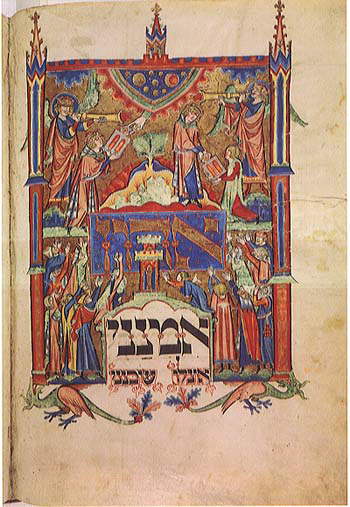Another reason traditional Jews de-emphasize the Ten Commandments is that the ten are considered just 10 of the 613 mitzvot that bind Jews. "Within Judaism, the normative thrust is that all mitzvot are equal. Are the 10 commandments more important than others? Rabbinic tradition says no," according to orthodox Rabbi Gavriel Newman. While in most synagogues, congregants stand when the Ten Commandments are read in the Torah, the practice in some Orthodox synagogues is to sit, a deliberate act, the echo of the ancient dispute with the Christians.
"You stand for the Ten Commandments -- and the Song of the Sea -- not because they are more important than other pieces, but to replicate the experience," says Arian, formally a pulpit rabbi at a Conservative synagogue in York, Pa. "They didn't sit down to cross the Reed Sea, they walked. They stood at Sinai. One bit of the Torah is not more important than the others."
Finally, not only are the numbering and significance of the Decalogue a matter of
dispute; its content is unclear as well. There are, of course, two versions of
the Decalogue in the Torah, one beginning with Exodus 20:2 and the other with
Deuteronomy 5:6. These versions differ in important respects, the most
well-known of which regards the Fourth Commandment. In the Exodus
version, the word zachor (remember) is used
("Remember the Sabbath day and keep it holy.") In Deuteronomy, the word shamor
(safeguard) is substituted ("Observe the Shabbat day and keep it holy.")
 Such differences, to those who believe the Torah to be written by humans and assembled from multiple texts, are clear proof that the Ten Commandments are not the "word(s) of God." To traditionalists, God can recite multiple words simultaneously, and thus there are no inconsistencies. Alternatively, since the recitation in Deuteronomy was part of Moses' speech to the Israelites before his death, some commentators suggest that Moses wanted to editorialize a bit. Homiletical interpretations abound -- for example, that God wanted to make sure the Israelites understood that there are both normative and restrictive aspects to the Sabbath laws -- but the ambiguity remains.
Such differences, to those who believe the Torah to be written by humans and assembled from multiple texts, are clear proof that the Ten Commandments are not the "word(s) of God." To traditionalists, God can recite multiple words simultaneously, and thus there are no inconsistencies. Alternatively, since the recitation in Deuteronomy was part of Moses' speech to the Israelites before his death, some commentators suggest that Moses wanted to editorialize a bit. Homiletical interpretations abound -- for example, that God wanted to make sure the Israelites understood that there are both normative and restrictive aspects to the Sabbath laws -- but the ambiguity remains.
Granite and Irony
Roy Moore sought, in two-ton granite symbols, a symbol of unchanging truth and bedrock principles which undergird his America. Yet in fact the two tablets contain within them a complicated, contentious, and ambiguous text. Ironically, the tablets of Moore's Law may well be an apt and unintended symbol for what democratic judicial review, like Biblical interpretation, is meant to be about: wrestling with uncertain meaning, understanding text in the context of lived experience. They may not, indeed, be carved in stone.
Indeed, for many, the chief significance of the Ten Commandments is not in their content but in Sinai's status a revelatory moment. Says Rabbi Newman, "it is not so much the Ten Commandments, as it is the representation of the revelation, the expression of God's desire that we adhere to the Divine." So contrary to Moore's presumed reading, Sinai is a moment of imperative, not dogmatism: the two tablets stand as a challenge to sort out what a life of Divine significance would be.

Douglas Rushkoff talks with Zeek about the future of Judaism
July, 2003
A review of Douglas Rushkoff's Nothing Sacred
July, 2003
Toward a postmodern Judaism
Hypercapitalism as Satanism
Dick Cheney and the New Age
If crass capitalism stops us from killing each other, is it such a bad
thing after all?
August, 2003
June, 2003
The weird and worrying links between the radical Left and the Islamist Right
April, 2003
March, 2003
The other reality TV
August, 2003
The ambiguities of art and life
March, 2003
Confrontation and cooperation in the face of odious leaders
February, 2003
Alienated politics in an age of ignorance
December, 2002
For the Left's voice to be heard, it needs to play by the rules
November, 2002
October, 2001



"We are Seriously Concerned
About the Fate of
the State of Israel"
An interview with four former Israeli Intelligence Directors
Are the Ten
Commandments
Carved in Stone?
Joel Shurkin
Run Like the Wind
Dan Friedman &
Jay Michaelson
Erev
Temima Fruchter
Fleeing Edges
Noam Mor
Josh Goes to Services
Josh Ring
Archive
Our 400 Back Pages
Saddies
David Stromberg
Zeek in Print
Fall 03 issue now on sale
About Zeek
Events
Contact Us
Links
From previous issues:
Strasbourg Cathedral Michael Shurkin
Skepticism Does Not Exist
Jay Michaelson
Far from Heaven: Excavating Paradise
Peter Conklin and Dan Friedman
